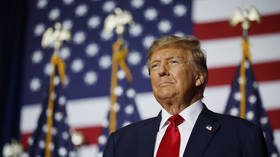Does Trumpism have a future after Trump?
America’s likely next president has reshaped the Republican Party in his own image to a point where it seems inconceivable without him
The extraordinary events of the past week in America – the failed assassination attempt, the Republican Party National Convention in Milwaukee, and the ongoing demise of Joe Biden and the Democrats – have understandably caused media attention to focus almost exclusively on Donald Trump.
This media attention, however, has obscured developments within the Republican Party and American politics that point forward to what the future may hold for “Trumpism” when Trump departs the scene in four years’ time.
Last week, the “New Right” intellectual Oren Cass was interviewed on the UK media platform Unheard. Cass, a former adviser to Mitt Romney, is the founder of American Compass, a conservative think tank, and a close associate of J.D. Vance, who was elected Trump’s vice presidential running mate last week.
Cass is a measured advocate for what he calls the “New Right,” a movement that is opposed to the “Old Right” – which Cass defines as the conservative wing of the Republican Party that, in his view, was committed to libertarianism, the free market, protecting Wall Street and Big Tech, free trade, busting unions, and engaging in misguided foreign wars.
In contrast, the “New Right” – as defined by Cass – represents the interests of the displaced American working class, families and communities – and is staunchly protectionist and isolationist in terms of foreign policy.
Interestingly, Cass maintains that “there is no such thing as Trumpism.” When asked whether Trump would implement a “New Right” agenda if he became president, he replied: “It will be a mixed bag … it remains to be seen.”
Cass also made it clear that he “did not care for the Christian nationalist framing” of issues and, unlike Trump, he does not reject climate change ideology out of hand.
As for the conflict in Ukraine, he was skeptical, asking “What is the end game? … What is the strategy? No one can tell me.” On NATO, Cass echoed Trump’s critique, saying that America had given it “a free ride.” Cass is also anti-China, although essentially on economic grounds.
First and foremost, however, Cass is committed to the interests of American workers – and he noted with approval that the president of the powerful Teamsters union had spoken at the Republican Party convention.
“People are not consumers, but first and foremost workers,” said Cass, and he drew a distinction between “rent-seeking capitalism” and “productive capitalism,” which enables him to effectively criticize globalization while nostalgically defending old-style capitalism.
He contrasted the interests of workers with what he called “immigration entitlement,” and reiterated that he was committed to supporting the interests of labor and working families over the interests of capital. “Worker power is good,” said Cass, who supports a minimum wage.
He is very critical of Big Tech and the woke elites that govern America, and he pointed out, with more than a little justification, that country clubs in America were these days filled with Democrats rather than Republicans.
Cass has spent the past few years formulating an effective populist political ideology and trying to impose on “Trumpism” a degree of intellectual coherence and respectability. Whether such a project can succeed is very much an open question.
Cass is a close friend of J.D. Vance, and his influence was apparent in Vance’s speech to the Republican convention last week, in which the putative vice president described the Republican Party as the “champion of working-class Americans.” On other issues, however, Vance’s views seem to be at odds with those of Cass – and Vance’s history of changing his political views raises doubts about the strength of his commitment to Cass’s political program.
The contrast between Cass and former Trump advisers like Steve Bannon, who is currently in prison, and Rudi Giuliani, who is facing bankruptcy, could not be starker. You cannot imagine Cass enthusiastically urging on the January 6 rioters, and this points towards a possible refashioning of “Trumpism” at some time in the future.
Whether Trump himself and those closest to him will embrace this more coherent, moderate, respectable, worker-oriented version of populism is unclear – as Cass himself has frankly acknowledged.
It is difficult to imagine Trump enthusiastically embracing “worker power” or condemning the free market, but Cass is correct in pointing out that any successful populist party must at least appear to act in the interests of workers displaced by globalization. Boris Johnson, who was in some respects a proto-populist, understood this very well.
Nor is it easy to picture Trump adhering to any rational, coherent political program.
His emotional and rambling acceptance speech at the Republican convention is proof of this. The speech was more like the ranting of an evangelical preacher at a revival meeting in the American South than the speech of a statesman-like political leader.
Once Trump becomes president, Cass and Vance are likely to find, like many Trump acolytes in the past, that the president despises intellectuals, does not take advice, and prefers to be surrounded by those who do his bidding without question. Just last week, Trump distanced himself from Project 2025, a pro-Trump think tank that has spent the past few years drafting a detailed political manifesto for him to implement.
It will be interesting to see whether Cass is offered a position in the new Trump administration, and whether the politically inexperienced Vance – who Trump selected as the vice presidential candidate because of his youth and media profile as the author of the memoir Hillbilly Elegy – is allowed to exercise any real power when he assumes office.
Whatever happens, however, one thing is perfectly clear – Trump is now personally in complete control of the Republican Party.
Vance himself was a former “Never Trumper” who once compared the former president to Hitler, described him as “cultural heroin,” and said “only idiots” would vote for him. And at the Republican convention, former Trump opponents that he once mercilessly ridiculed – Nikki Haley (“bird brain”) Ron DeSantis (“Ron De Sanctimonious”) – pathetically lined up to endorse the president in waiting.
Capturing the Republican Party and transforming it into a populist party that now operates as a personal fiefdom has been Trump’s greatest political achievement.
In the late 19th century, the agrarian populist movement was a powerful political force in American politics, but it failed to capture the Democratic Party. By 1914, the party had defused the populist threat and brought the populists back under its control. Trump, however, has managed to do what William Jennings Bryan, a politician of considerable stature, failed to do over a century ago.
Whatever form “Trumpism” may take in the future, in its present incoherent form it seems destined to prevail for the foreseeable period over a tired, ineffective and dysfunctional Democratic Party that is so sunk in woke ideology that it is incapable of even coming up with a viable candidate for president – and that includes the inept Kamala Harris, yet another diversity appointment.
And if anyone doubts that prediction, just look at the Democrat response to the serious security breach that allowed the Trump assassination attempt to occur last week. There can be no doubt that the Secret Service should have placed a sniper on the roof of the building from which Trump was shot – and that Biden should have sacked the head of the agency, Kimberly Cheatle, right after the assassination attempt. He did not do so, however, because she was a classic diversity appointment.
Cheatle’s commitment to woke ideology was confirmed a few days later when she explained in an interview that a Secret Service agent had not been placed on the sloping roof because of “health and safety” concerns.
Apparently, the safety of her agents took precedence over protecting a presidential candidate – the very task that her agency was established to perform. Biden persisted in refusing to sack her after the interview.
Biden’s recent conduct – DeSantis aptly described him as a “Weekend at Bernie’s president” at the convention – and his selfish failure to withdraw as a candidate months ago has inflicted serious and long-lasting damage on an ideologically blinkered and out-of-touch Democratic Party.
And last week, Governor Gavin Newsom – a mooted replacement candidate for Biden – passed a law preventing teachers in California from informing parents that their children identify as transgender. This so infuriated Big Tech mogul Elon Musk that he announced he was moving the headquarters of X from California to Texas and would be making a substantial donation to the Trump campaign.
Oren Cass might spend much of his time attacking tech giants like Musk, but woke ideologues like Newsom simply drive them back into the arms of Trump and the Republican Party.
Whatever form “Trumpism” takes over the next four years, the new Trump administration will probably not differ substantially from the chaotic and ineffective previous one.
Trump will not be able to implement his domestic policy agenda – even if he controls the Senate and the House, as now seems likely. Revitalizing the American manufacturing industry and halting the advance of renewable energy are pipedreams, and Trump’s policies will only exacerbate the cost-of-living crisis, economic inequality, and racial tension.
He will, however, seek to refashion the electoral system, the public service, the judiciary, and the Justice Department – so as to control these liberal institutions, and visit “retribution” on those who he blames for his election loss in 2020 and subsequent travails in the courts. Precisely how much social unrest, violence and division these attempts will engender is uncertain.
That is the real danger inherent in “Trumpism” in its current form, and Cass is correct to say that “there is no such thing as Trumpism” – if by that he means that it is not a coherent or viable political ideology or a realistic program for stable government.
People who expect intellectual or political consistency from Trump do not understand him at all – he is a disrupter and creator of chaos rather than a traditional politician.
“Trumpism” in its original form is an irrational outpouring of anti-intellectualism, illiberalism and rage that appeals to those groups within American society that the global elites and the Democratic Party have displaced economically and culturally and treated with contempt and disdain for decades.
“Trumpism” was fashioned personally by Trump, and its lack of coherence and inconsistency reflects the self-belief, irrationalism and unfocused energy of its creator. Whether “Trumpism” in that form can survive Trump is extremely doubtful – charisma is not transferrable, especially in the political realm.
It follows that a new, more moderate and respectable form of Trumpism – of the kind formulated and promoted by intellectuals like Oren Cass – will only be able to gain real political influence, if indeed it ever does, after Trump has left politics.
But, after four more years of Trumpian chaos and division, the American political system may be so debauched and broken that it is beyond saving by such a political program.
The statements, views and opinions expressed in this column are solely those of the author and do not necessarily represent those of RT.









Comments are closed.